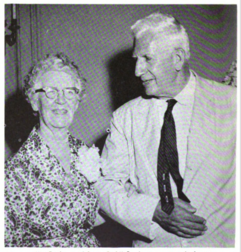Ernestine Friedmann
Ernestine Louise Friedmann (September 11, 1884 – September 1973) was an American economist and educator. She was a professor of economics and taught at the Barnard and Bryn Mawr Summer School for Women Workers.
Early life and education
Friedmann was born in Brooklyn, New York, the daughter of John Friedmann and Josephine Henrietta Heil Friedmann, who were both born in New York. She graduated from Smith College in 1907,[1] and earned a master's degree from Columbia University in 1916;[2] she completed doctoral studies in economics at Columbia in 1926,[3] with a dissertation titled "A Study of the Workers' Education Movement in the United States."[4]
Career
Friedmann was a professor of economics and the head of the economics departments at Rockford College and Wheaton College in Illinois. She wrote about the cooperative movement,[5] about women in industrial work,[6] and about minimum wage and cost of living, asking "Shall we continue to safeguard the system and to establish a minimum wage that creates a standard of living that permanently enslaves the wage earning class? Or shall we chart what we consider the standards of 'an abundant life' and work to establish that order of society that will make them possible to all of us alike?" in a 1922 essay for The World Tomorrow.[7]

During World War I, Friedmann was active in the national leadership of the YWCA,[8][9] and wrote several booklets in that work.[10][11][12] She directed the Barnard College Summer School for Women Workers[13][14] and the Bryn Mawr Summer School for Women Workers.[15] She worked with Hilda Worthington Smith in the 1930s, on adult education programs.[16][17] "The principle of democracy underlies every step in workers' classes, emphasizing the learning process rather than the teaching process," they explained in 1937.[18] With the Federal Emergency Relief Administration, she taught adults across the United States.[19][20] Charlotte Wilder dedicated her poetry collection Phases of the Moon (1939) to Friedmann and novelist Evelyn Scott.[21]
Friedmann was a member of the National Women's Trade Union League[22] and the American League for Peace and Democracy.[23] She joined the staff of the Washington International Center when it opened in 1950 and retired from that work on July 1, 1962.[3][24]
Personal life
Friedman died in 1973, aged 89 years, in Maryland.
References
- ^ Smith College (1917). Alumnae Register Issue. The Association. p. 105.
- ^ Columbia University (1916). Catalogue of Officers and Graduates of Columbia University from the Foundation of King's College in 1754. The University. p. 1028.
- ^ a b "Miss Friedmann Retires". Department of State News Letter. 3: 40. July 1962.
- ^ "Doctoral Dissertations". American Economic Review. 18: 612. September 1925.
- ^ Friedmann, Ernestine L. (December 1920). "Woman's Place in the Cooperative Movement". Life and Labor. 10: 319–320.
- ^ Friedmann, Ernestine L. (June 1921). "The Place of Women in American Industry". Lutheran Woman's Work. 14: 206–208.
- ^ Friedmann, Ernestine L. (June 1922). "Puncturing the Minimum Wage". The World Tomorrow. 5: 173–175.
- ^ Marshall, Marguerite Mooers (1919-01-13). "Day of 'Home Girl' Over; War Works Taught her to Like Pay Envelope". St. Louis Post-Dispatch. p. 17. Retrieved 2021-07-20 – via Newspapers.com.
- ^ Frederickson, Mary; Cobble, Dorothy Sue (1984). "Citizens for Democracy". In Frederickson, Mary; Kornbluh, Joyce L. (eds.). Citizens for Democracy:: The Industrial Programs of the YWCA. Workers' Education for Women, 1914–1984. Temple University Press. pp. 75–106. doi:10.2307/j.ctv6mtdfq.9. JSTOR j.ctv6mtdfq.9. Retrieved 2021-07-20.
{{cite book}}:|work=ignored (help) - ^ "The Young Women's Christian Association Revises Industrial Literature". Industrial Progress. 3: 7–9. November 15, 1921.
- ^ Friedmann, Ernestine L. (1918). The Industrial Club and Its Program ... National board, Young Women's Christian associations.
- ^ Friedmann, Ernestine L. (1920). The Federation-an Industrial Movement. National Bd. Y.W.C.A.
- ^ "Some Unique Features of the 1928 Barnard Summer School". The American Federationist. 35: 1503. December 1, 1928 – via ProQuest.
- ^ "39 Women Workers Enrolled at Barnard". The New York Times. July 11, 1932. p. 11 – via ProQuest.
- ^ Potter, A. A. (1928). "Local and Chapter Notes". Bulletin of the American Association of University Professors (1915–1955). 14 (6): 457–482. ISSN 0883-1610. JSTOR 40218024.
- ^ Kornbluh, Joyce L.; Goldfarb, Lyn; Davis-Faulkner, Sheri (1981). "Labor Education and Women Workers". In Wertheimer, Barbara Mayer (ed.). Labor Education and Women Workers:: An Historical Perspective. Temple University Press. p. 21. doi:10.2307/j.ctv6mtdqk.9. JSTOR j.ctv6mtdqk.9. Retrieved 2021-07-20.
{{cite book}}:|work=ignored (help) - ^ Friedmann, Ernestine L. (1935). Report of Teachers Training in Workers' Education, Summer of 1934. Federal Emergency Relief Administration.
- ^ Smith, Hilda W.; Friedmann, Ernestine L. (January 1937). "Methods in Workers' Education". Adult Education Bulletin. 1: 2–6, quote on 3-4.
- ^ "National Consultant Addresses Institute". The Times-Tribune. 1938-09-09. p. 24. Retrieved 2021-07-20 – via Newspapers.com.
- ^ Friedmann, Ernestine L. (December 1934). "Education in the Frontier Communities of Nevada". Concerning Workers' Education. 1: 12–13.
- ^ Maun, Caroline (2013-01-23). Mosaic of Fire: The Work of Lola Ridge, Evelyn Scott, Charlotte Wilder, and Kay Boyle. Univ of South Carolina Press. ISBN 978-1-61117-267-6.
- ^ "Society". The Washington Post. 1919-10-18. p. 7. Retrieved 2021-07-20 – via Newspapers.com.
- ^ United States Congress House Special Committee on Un-American Activities (1938–1944) (1939). Investigation of Un-American Propaganda Activities in the United States: Hearings Before a Special Committee on Un-American Activities, House of Representatives. U.S. Government Printing Office. p. 6404.
{{cite book}}: CS1 maint: numeric names: authors list (link) - ^ "Miss Friedmann Retires". State Department Newsletter. 1 July 1962. p. 40.

